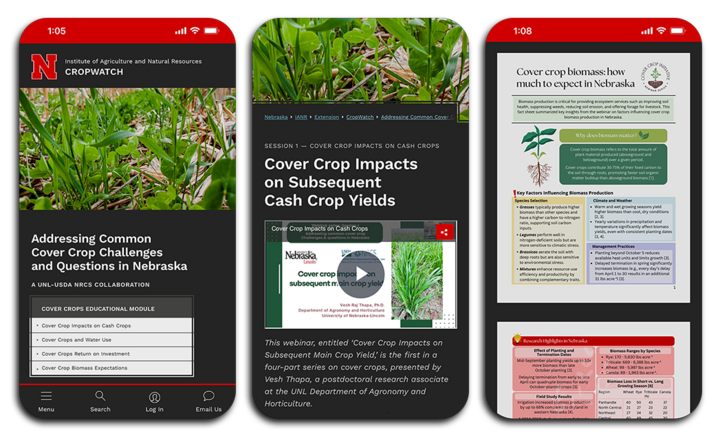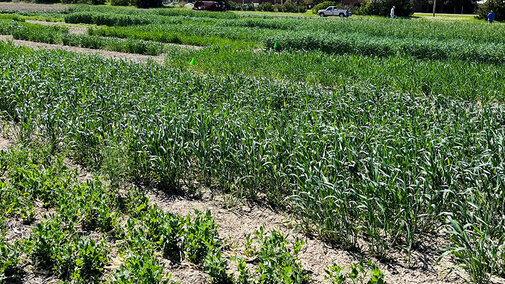Cover crops are increasingly seen as valuable conservation tools, but many producers and technical advisors still have questions about how to manage them effectively. To support conservation efforts across the state, the University of Nebraska–Lincoln (UNL) and the Nebraska Natural Resources Conservation Service (NRCS) have launched a new educational module aimed at expanding Nebraska-specific knowledge related to cover crops.
This interactive module includes a collection of curated resources — webinar recordings, presentation slides, transcripts, fact sheets and a list of additional materials — developed as part of a webinar series held between October 2024 and January 2025. Designed for producers, conservation planners and extension professionals, the materials aim to provide practical responses to the common questions that arise when considering cover crop management across Nebraska’s diverse regions.
The module serves as more than a one-time learning tool — it's a free resource users can return to as needed. All materials are easily downloadable for offline use. It is now available to the public through UNL’s CropWatch platform at: https://cropwatch.unl.edu/answering-cover-crop-questions.
Within the module, each webinar session is organized under a separate, user-friendly navigation tab. Here's what you can explore:
1. Cover Crop Impacts on Subsequent Cash Crop Yields
This session lays the foundation by explaining how cover crops influence crop yields through their effects on nutrient cycling, ground cover, residue characteristics, and weed suppression. It includes findings from meta-analyses, small-plot trials, on-farm research, review articles, farmer surveys, and Nebraska-based studies, highlighting cash crop-specific responses and key management considerations.
2. Cover Crops, Water Use and the Water Cycle: What Does the Evidence Tell Us?
Water management is a major concern for Nebraska producers, particularly in drier regions. This session examines how cover crops influence many elements of the water cycle, including water infiltration, runoff, evapotranspiration and moisture retention. Drawing on global studies, regional research from Nebraska and Iowa, and multi-location trials in western Nebraska and eastern Colorado, the session helps producers and advisors better understand water-use tradeoffs and how to manage them.
3. Considering How Cover Crops Offer Returns on Investment
Profitability remains a top concern for many growers. This session introduces partial budget analysis as a tool to assess potential cost savings and revenue impacts. It features insights from a SARE Technical Bulletin, the Soil Health Institute’s economic analysis of 100 farms (including 12 in Nebraska), as well as real-world case studies and farmer experiences. It also highlights tools such as UNL’s Crop Budgets and the Ag Budget Calculator to help users run their own financial scenarios.
4. How Much Cover Crop Biomass to Expect in Nebraska
Biomass production is key to achieving benefits such as weed suppression and erosion control. This session discusses what to realistically expect based on species, planting windows and management practices. It introduces the concept of the “cover crop growth gap”— biomass lost due to shorter growing periods — and presents data from field trials and a simulation modeling study across Nebraska’s varied climate zones.

Each session concludes with a summary of key takeaways and practical management tips, making it easy for both new and experienced users to apply what they’ve learned. Unlike many other resources, this module focuses specifically on Nebraska’s unique environmental conditions, cropping systems and challenges.
This module is free and open to all and is especially valuable for NRCS conservationists and planners, UNL extension educators, farmers, ag consultants, and anyone working with or advising on cover crops in Nebraska.
Cover crops can offer multiple benefits — but successful implementation can be knowledge-intensive. This educational module intends to bridge the gap between research and real-world application, bringing science-based insights directly to the field.

